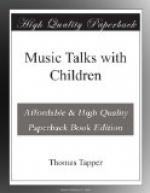A practice hour can only be an hour of unwelcome labor when one thinks so of it. If we go to the piano with interest in the playing we shall be unconscious of time. Many men who love their labor tell of sitting for hours at their work not knowing that hours have gone by.
If there is a love for music in any of us it will grow as a seed. And as the seed needs the dear mother-earth, so the music needs the heart. When it has taken root there and becomes firmer and firmer it will begin to show itself outwardly as the light of the face. After it is strong and can bear up against what assails it—not the wind and the rain and the dry leaves, but discouragement and hard correction and painful hot tears—then with that strength it will flourish.
Now, sometimes, in the days of its strength the music will seek far more in its life, just as the plant seeks for more and blossoms. The flower in the music is as great for all as for one. It is joy and helpfulness. When for the love of music one seeks to do good then music has borne its blossom.
Thus, by learning the life of a simple plant we learn the true mission of the beautiful art of tone. It must put forth deeply its roots into the heart that it may be fed. It must strive for strength as it grows against whatever may befall it. It must use its food of the heart and its strength for a pure purpose, and there is but one—to give joy.
This turns our thoughts to two things: First, to the men and women who by their usefulness and labor increased the meaning of music. This is the glory of their days. Second, we look to ourselves with feeble hands and perhaps little talent, and the thought comes to us, that with all we have we are to seek not our own glorification but the joy of others.
CHAPTER XIX.
THE IDEAL.
“Le beau est aussi utile que l’utile,
plus peutetre.”—Victor
Hugo.
Mozart once had a friend named Gottfried von Jacquin, who was a man of careful thought, and evidently a good musician,—for we are told that a melody composed by him is frequently said, even to this day, to be by Mozart. This Gottfried lived in Vienna with his father, and to their house Mozart often went. At this time Mozart had an album in which his friends were invited to write. Among the verses is a sentiment written by Gottfried von Jacquin, saying:
“True genius is impossible without heart; no amount of intellect alone or of imagination, no, nor of both together, can make genius. Love is the soul of genius.”
Here we have the same truth told us which we have already found for ourselves, namely, that all good music comes from the heart. We have found it by studying music and striving faithfully to get deep into its real meaning. But to-day we have the words of one who was enabled to watch closely as a friend one of the greatest composers that ever lived. And being much with him, hearing the music of the master played by the master himself, put the thought into his head, that it is impossible to be a true genius without heart and love.




